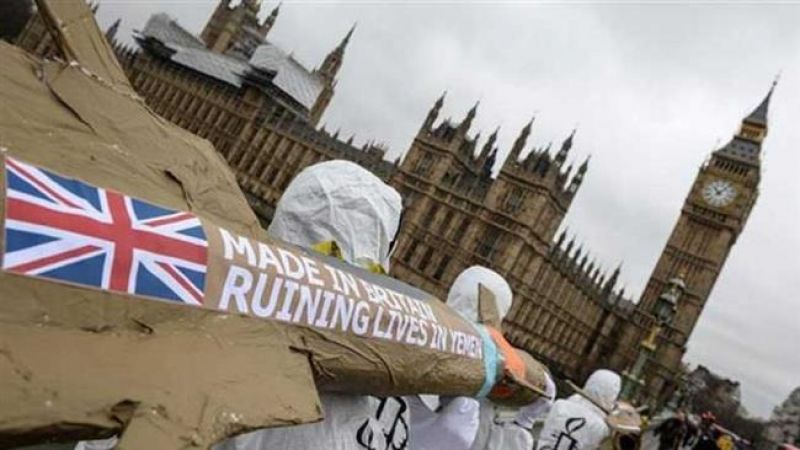
By Rick Noack
As U.N. and international humanitarian agencies raise the alarm over the Saudi blockade of aid deliveries to Yemen, European and American officials have remained mostly silent. The few remarks coming out of Western capitals in recent weeks have hardly been messages of support for the Yemenis in the midst of a catastrophic humanitarian crisis — in fact, quite the opposite.
Two weeks ago, Britain’s then-Defense Minister Michael Fallon offered a blunt assessment of the government's view on the controversy. “I have to repeat, sadly, to this committee that obviously other criticism of Saudi Arabia in this Parliament is not helpful,” Fallon told the parliamentary defense committee, to which he defended the planned sale of several fighter jets to Saudi Arabia. (Fallon has since resigned over sexual harassment allegations.)
In response to a missile attack from Yemeni territory targeting Saudi Arabia — which triggered the most recent escalation of the crisis — President Trump similarly ignored the plight of civilians in the war-torn country and instead went on to praise U.S. weapons sold to Saudi Arabia.
“A shot was just taken . . . at Saudi Arabia. And our system knocked it down,” Trump said, referring to the Patriot missiles the United States has sold to the kingdom. “That’s how good we are. Nobody makes what we make, and now we’re selling it all over the world.”
Both the United States and Britain have been making more money with arms sales to Saudi Arabia in recent years than ever before. Human rights critics fear that Saudi Arabia has not only bought their weapons but their acceptance for its policies.
“The shameless arms supplies to Saudi Arabia … may amount to lucrative trade deals, but the U.K. risks aiding and abetting these terrible crimes,” James Lynch, head of Arms Control and Human Rights at Amnesty International, said in a recent statement.
The defense industry employs tens of thousands of workers in Britain, where concerns over faltering economic prospects are on the rise.
It is far from being the only European country involved in the controversial deals, however. More than a dozen European Union nations are selling arms or military equipment to Saudi Arabia, with Britain being followed by France as a top exporter, according to the Stockholm International Peace Research Institute.
Such sales have been especially controversial since Saudi Arabia is engaged in an escalating conflict with Iran as the two fight for dominance in the region. Their rivalry will likely be felt most in the Arab world’s poorest country, Yemen, Saudi Arabia’s neighbor. Houthi forces … there are believed to have received financial support and arms deliveries from Iran, which has drawn the country into the regional power dispute.
For the past three years, Saudi Arabia and its Persian Gulf allies have been trying (so far unsuccessfully) to dislodge the Houthi revolutionaries … from their territory, relying mainly on aerial bombings. More than 20 million people in Yemen need humanitarian assistance and 7 million are facing “famine-like” conditions, aid groups say.
Of course Saudi Arabia’s attractiveness to Western countries is not just about arms sales. On Thursday, Downing Street said it would provide Saudi energy giant Aramco with credit guarantees of $2 billion to facilitate trade between the two countries. Britain and the United States are both trying to persuade Aramco to hold its much anticipated IPO (valued at hundreds of billions of dollars) on the London and New York stock exchanges, with President Trump tweeting that such move would be “Important to the United States!”
So far, all efforts to stop arms exports to Saudi Arabia have failed, although there appeared to be a change of course among Western governments not too long ago. In 2015, then-Foreign Secretary Philip Hammond encouraged an inquiry into the impact of British arms in Yemen. This year, Germany pressured Saudi Arabia into ending its arms purchases, possibly to preempt an official ban that could have become a PR disaster for the kingdom.
In the United States, the Obama administration similarly suspended the sale of precision guided munitions to Riyadh last year. However, the Trump administration is believed to be working on the resumption of such sales. A separate major U.S. arms export deal to the kingdom was struck in May, and Trump has voiced increasingly strong support for the Saudi leadership ever since. Similarly, Germany is still exporting military equipment to the kingdom, although it now appears to be refraining from direct arms deliveries.
If E.U. politicians were determined to implement an arms embargo on Saudi Arabia, parliamentarians would have to persuade the governments of all member states to agree to such a ban. With more than a dozen nations profiting from arms and military equipment exports to the kingdom, the chances of such an embargo being implemented anytime soon are virtually nonexistent.
Attempts by nongovernmental organizations to force governments into committing to an embargo enforced by courts have so far also been blocked. Campaigners suffered a major defeat this summer, when London’s high court ruled that Britain was not complicit in alleged war crimes in Yemen by allowing the Saudi military to use its arms.
The court refused to say how it came to its conclusion, however, and barred the public from accessing the key evidence.
On Thursday the United Nations and 20 other aid groups once more demanded the lifting of the Saudi blockade, warning that it was bringing millions closer to “starvation and death.”
Source: The Washington Post, Edited by Website Team